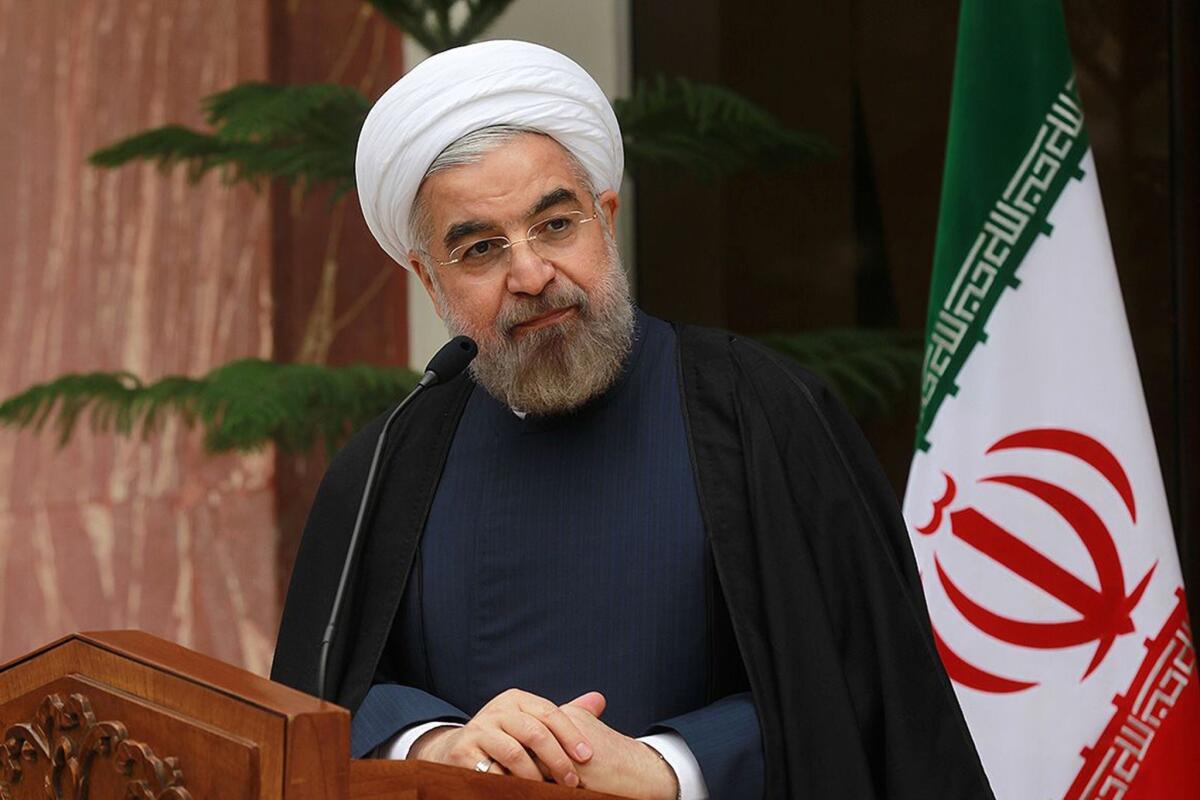What defusing Iran would mean

- Share via
When Israeli Prime Minister Benjamin Netanyahu drew his red line across a cartoon bomb at the United Nations in September 2012, he highlighted the most pressing issue with Iran’s nuclear program: the Islamic Republic’s ability to enrich uranium to near-bomb grade. If Iran enriched enough uranium to 20% purity, Netanyahu warned, it could further enrich it for a bomb in “a few months or a few weeks.”
Netanyahu predicted that Iran would cross his red line by this spring or summer at the latest. “That’s why everyone,” he said, “should have a sense of urgency.”
Stopping this near-term threat is urgent, but rolling back Iran’s program would also open the way to reducing even greater nuclear threats.
Iran did not cross Netanyahu’s line, though he was right to be worried. By this August, Iran had stockpiled about 185 kilograms of this type of uranium, according to the International Atomic Energy Agency. If it reached 240 kilograms, it would cross the Israeli red line. That does not mean Iran would build a bomb, but that amount could be converted into the material for the core of a bomb in about two months and, according to U.S. intelligence estimates, a crude nuclear device in about a year.
That is why the first phase of the deal crafted in Geneva is so important. It eliminates the threat Netanyahu said was his most serious concern. It stops all enrichment of uranium above 5% and requires Iran to convert all of its 20% uranium into forms much less usable for a bomb. It halts the manufacture, installation or operation of new centrifuges, and implements tough, new daily inspections that could spot a dash to a bomb, giving other nations time to act.
Even without the deal, we now know that under its pragmatic new president, Hassan Rouhani, Iran had already slowed the parts of the program that so troubled Netanyahu last year. The latest IAEA report shows that since Rouhani became president, the output of the nuclear program has stagnated.
In the last reporting period before Rouhani asserted control, Iran installed 1,800 first-generation centrifuges; since then, only four. Last period, it installed 319 second-generation centrifuges; since then, zero. Most important, it increased its supply of 20% enriched uranium by a mere 10 kilograms. Iran also did not install any major new components for its Arak reactor, a possible source of plutonium for a bomb.
Rouhani has clearly hit the pause button. The first phase of the Geneva deal makes this pause binding. It thus solves the most urgent problem, doubling the time it would take for Iran to “break out” of its commitments. Any final agreement could ensure that Tehran never crosses Netanyahu’s line.
It is often said that stopping the spread of nuclear weapons and persuading countries with them to reduce what they have are two sides of the same coin. Iran proves the point. Although there is no logical connection between the 5,000 nuclear weapons in the U.S. active nuclear arsenal and the possibility that Iran might someday get one or 10, psychologically and politically there is. Politicians often cite Iran as the reason why the U.S. would be foolish to cut its weapons while Iran is racing to get them.
Stopping Iran would not just eliminate the most discussed nuclear threat facing the United States, it would also bring us closer to the end of nuclear proliferation. President Kennedy worried that unless something was done, 20 to 25 nations would someday have nuclear weapons. The steps he took to limit the testing of nuclear weapons and construct a regime that would stop their spread helped persuade most states not to go nuclear.
But not all. Iran and North Korea are the last ripples of the nuclear wave that began with Hiroshima. There are no other nations with programs as expansive or dedicated as these.
Stopping Iran’s program could make it easier to persuade North Korea to make a similar deal and other nations not to begin programs. It would also help create the security conditions necessary for the eight nuclear-armed states to consider cuts in their arsenals. If other states are not getting nuclear weapons, what justifies the expense of keeping thousands in the U.S. and Russia arsenals and dozens in French, British, Chinese, Israeli, Indian and Pakistani arsenals?
None of this is automatic, but failing to stop Iran makes disarmament and nonproliferation much harder. Justified or not, the uncertainty created by the Iranian program is a major reason why there has been so little progress on these fronts.
A negotiated end to Iran’s program is not just important in and of itself. It is the gateway through which the global effort to end the threat of nuclear weapons must pass.
Joseph Cirincione is the president of Ploughshares Fund, a global security foundation, and the author of “Nuclear Nightmares: Securing the World Before It Is Too Late.”
More to Read
A cure for the common opinion
Get thought-provoking perspectives with our weekly newsletter.
You may occasionally receive promotional content from the Los Angeles Times.









